PRE-ORDER NOW at 20% off, four great new titles dealing with hard, personal stuff.
Of course, we can take pre-orders for anything and we now have waiting lists for all sorts of great forthcoming titles, from Jemar Tisby’s important How to Fight Racism: Courageous Christianity and the Journey Toward Racial Justice (Zondervan; $24.99) to Mako Fujimura’s long awaited Art + Faith: A Theology of Making (Yale University Press; $26.00) both due in early January 2021. I certainly hope we’ll get some pre-orders for the much-needed study Public Intellectuals and the Common Good: Christian Thinking for Human Flourishing edited by Todd Ream and others (IVP Academic; $25.00) that is also due in January. You know we’ve been taking pre-orders for the authorized biography of Eugene Peterson by Winn Collier, pushed back to be released in March 2021, called A Burning in My Bones (Waterbrook; $28.00.) And I can’t wait for Praying with Our Feet: Pursuing Justice and Healing on the Streets by Lindsey Krinks (coming from Brazos Press for $17.99 in early February 2021.) We are taking pre-orders, offering 20% off, and invite you to add your name to the waiting lists. Or, pre-order whatever else you’ve heard about that tickles your fancy, from the next novel by your favorite fiction writer to a forthcoming kid’s book you heard of to a cool new cookbook to the many important books of Biblical studies and theology that are coming out. Let us know how we can help. Thanks.
For now, we are inviting you to order right away any of these four beautiful, well-written, and helpful forthcoming books. (In the case of the last two, they have just released so we will be sending those without delay.) These four seem to hang to gather, each addressing the sadnesses of our times, our broken hearts, finding faith in times of difficulty or doubt, reflecting on loss and loneliness. A bit of sadness, yes, but I assure you I enjoyed each one of these books; they are written with verve and distinction.
These authors all write very well, although each in her or his own way. They are not necessarily theologically similar, but they share a vibrant trust in telling the truth, being honest about the complexity of the human condition, and guiding us to life-giving and faith-filled responses. I have read most of (but not finished) all four and am proud to commend them to you now.
All are 20% off. As we say at the order form page, you can safely enter credit card digits or you can just ask us to send you a bill so you can pay by check later.
It is our custom to not charge credit cards until the day we actually send the books. So you can enter credit card info safely at our secure order form page but we won’t actually process the charge until we actually ship the books. We list the dates by the sale prices.
If you are ordering more than one of these PLEASE TELL US if you prefer us to send them each individually as they come out or if we should consolidate and ship together, later.
We tend to send things the least expensive way (“Media Mail” costs about $3.00 for one book) but we can upgrade to “Priority Mail” which is usually quicker than and always much cheaper than UPS. We can send UPS, too, if you’d rather. Just let us know your preferences or use the “inquire” page if you have any questions.
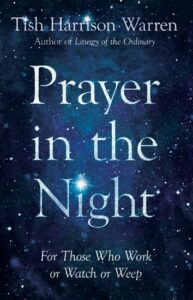 Prayer in the Night: For Those Who Work or Watch or Weep Tish Harrison Warren (IVP) $22.00 OUR SALE PRICE = $17.60 release date – January 26, 202
Prayer in the Night: For Those Who Work or Watch or Weep Tish Harrison Warren (IVP) $22.00 OUR SALE PRICE = $17.60 release date – January 26, 202
I have had the great privilege of having an advanced copy of this and it is nothing short of the most moving books I’ve read all year. From the breathtaking prologue where she narrates her praying the Compline prayers while in the hospital hemorrhaging with a tragic miscarriage, we know this is a very well-written book; a book with raw and painful observations about our broken lives in this fallen world, observations that are colored by her astute theology and a worldview baptized by her immersion in the Book of Common Prayer. That this forthcoming book is about praying the night-time prayer service, called Compline, should not be off-putting to those who are not familiar with fixed hour prayer or the habit of praying words given to us by a prayerbook. (She does offer some explanation of that tradition, how more formal liturgical prayers were the way of the early church, and an apology for their benefit. Even though she does not diminish more spontaneous and conversational prayers as an Anglican priest, she naturally is steeped in the importance of the prayer book and praying “the hours.”) No matter what your prayer habits or customs are, I am sure this extraordinary book will help.
I will want to do a more extended review of this when time permits, but a few quick notes, here, now. As I’ve noted, Prayer in the Night is a fabulous book which is honest about our hurts and fears and it will be useful for anyone asking the “where is God when it hurts” kind of questions. Technically called the study of “theodicy”, her one solid chapter on this is one of the best I have ever read. She insists that there is no tidy answer, not only because the mystery of the tension between God’s goodness and our suffering is such a tough nut to crack, intellectually, but because it is not, after all, primarily an intellectual question. We live this stuff; we cry out from our hearts when we feel abandoned or harbor fears or when injustices outrage us. Our cry is a protest (as it should be) and no abstract formula will do. That chapter alone is worth the price of the book.
That she works with the metaphor of darkness and talks quite specifically about the overnight hours is appealing, not only for the common-ness of it, but for the poetic and captivating way she writes about it. It’s really quite good. I think some of this will resonate with those who enjoyed Barbara Brown Taylor’s exquisite Learning to Walk in the Dark, a book I adore. (On the back cover, book lover extraordinaire Wesley Hill links the two, calling them “poet-theologian memoirists.”) Tish Warren’s honest but rugged orthodoxy and prayer-book theology and situated context in the life of a congregation takes her in a somewhat different direction than Taylor in that book and it makes Prayer in the Night, finally, a more transformative and I think enduring resource. In any event, it is lovely to read, enchanting at times, despite the overcast themes.
Listen to what author James Bryan Smith says of it:
 Tish has done it again! Good writers, Frederick Buechner once told me, ‘pay attention to their lives.’ By this standard, Tish Harrison Warren is a very good writer indeed. She tells stories from her own life–sometimes commonplace, sometimes heartbreaking–with great detail, and even greater insight. Using the brilliant, time-tested words found in Compline, a service of evening prayers used before sleep, as her outline, this well-written and deeply honest book will inspire you to begin using these prayers in your own life. It did for me. Reading this book was like having a meaningful conversation with a friend over a crackling fire and having a clear sense that you are the better for having engaged in it. Tish is far too young to be this wise. I am grateful for her life, for her searching faith, and I am very grateful for this special book. –James Bryan Smith, author of The Good and Beautiful God
Tish has done it again! Good writers, Frederick Buechner once told me, ‘pay attention to their lives.’ By this standard, Tish Harrison Warren is a very good writer indeed. She tells stories from her own life–sometimes commonplace, sometimes heartbreaking–with great detail, and even greater insight. Using the brilliant, time-tested words found in Compline, a service of evening prayers used before sleep, as her outline, this well-written and deeply honest book will inspire you to begin using these prayers in your own life. It did for me. Reading this book was like having a meaningful conversation with a friend over a crackling fire and having a clear sense that you are the better for having engaged in it. Tish is far too young to be this wise. I am grateful for her life, for her searching faith, and I am very grateful for this special book. –James Bryan Smith, author of The Good and Beautiful God- Give Your Angels Charge Over Those Who Sleep – Cosmos and Commonplace
- Tend the Sick, Lord Christ – Embodiment
- Give Rest to the Weary- Weakness and Silence
- Bless the Dying – Ashes
- Soothe the Suffering – Comfort
- Pity the Afflicted – Relentlessness and Revelation
- Shield the Joyous – Gratitude and Indifference
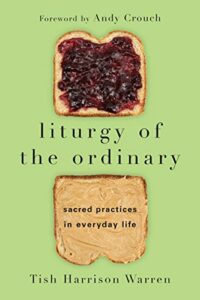 But yet, as with her fabulous, fabulous Liturgy of the Ordinary: Sacred Practices in Everyday Life there are upbeat moments as well. I laughed right out loud when she told how her young daughter, just learning to read, wanted to read the Compline prayer and mispronounced the word “sooth” as “smooth”, an adaptation their family (mis) prays to this day. She lists more than once the stuff she loves about the beauty of this world, a point that those who know her knows gladly recognize. Like any of us, she knows life’s sorrows, but she knows glory and goodness, too. (And she quotes some lines from some super-cool musicians, too, from the band Over the Rhine to the alt-county queen, Julie Miller, to the edgy Arcade Fire.) Praying in the dark is part of the territory, but so is a life of big and small pleasures, meaningful work, deep (if difficult) relationships. This book is not a “downer.” Despite the lament and injustice described, it retains a hopefulness, a joy, at times, even. I am in awe and how she weaves together this stuff, this life in God in and for the world, glorious and damaged as it is.
But yet, as with her fabulous, fabulous Liturgy of the Ordinary: Sacred Practices in Everyday Life there are upbeat moments as well. I laughed right out loud when she told how her young daughter, just learning to read, wanted to read the Compline prayer and mispronounced the word “sooth” as “smooth”, an adaptation their family (mis) prays to this day. She lists more than once the stuff she loves about the beauty of this world, a point that those who know her knows gladly recognize. Like any of us, she knows life’s sorrows, but she knows glory and goodness, too. (And she quotes some lines from some super-cool musicians, too, from the band Over the Rhine to the alt-county queen, Julie Miller, to the edgy Arcade Fire.) Praying in the dark is part of the territory, but so is a life of big and small pleasures, meaningful work, deep (if difficult) relationships. This book is not a “downer.” Despite the lament and injustice described, it retains a hopefulness, a joy, at times, even. I am in awe and how she weaves together this stuff, this life in God in and for the world, glorious and damaged as it is.I know of few writers today who write as pastorally, prophetically, and poetically as Tish Harrison Warren. I know of few writers of any time who write of the deep, dark stuff of life with as much hope, grace, and beauty as you will find in these pages. Prayer in the Night will bring to the darkness in your life a light that will carry you through the days. –Karen Swallow Prior, author of On Reading Well

You can easily order by using the “order” link at the end of this column. 20% off, too.
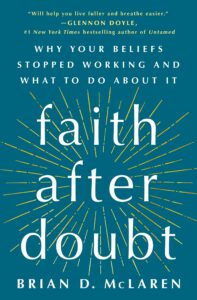 Faith After Doubt: Why Your Beliefs Stopped Working and What to Do about It Brian D. McLaren (St. Martin’s Press/Essentials) $26.99 OUR SALE PRICE = $21.59
Faith After Doubt: Why Your Beliefs Stopped Working and What to Do about It Brian D. McLaren (St. Martin’s Press/Essentials) $26.99 OUR SALE PRICE = $21.59
release date – January 5, 2021
See below for a special offer to get autographed book plates by Brian McLaren with pre-orders from Hearts & Minds.
We have quite a large selection of books on doubt on our store, from the rigorous God in the Dark by Os Guinness to Gregory Boyd’s The Benefit of the Doubt to Know Doubt by John Ortberg to bunches more, old and new. I am very pleased that McLaren — who has been a skeptic and seeker, a pastor and postmodern theologian, writer and citizen scientist — has offered his seasoned wisdom for those for whom, as the subtitle pointedly puts it, “beliefs stopped working.” We need this sort of book, I think, and it isn’t surprising that McLaren is there to fill this particular gap. Like others, he starts the book with some brief words on “permission to doubt.” He describes well the “moments of terror” that some feel when they find themselves not embracing the faith they once did. He gets it, and this is a warm and reassuring start for any doubter or jaded believer.
I realize that some strict evangelicals, including some I respect, do not think that McLaren is a reliable Christian author, that his progressive and generous view of God and the re-orientation of his understanding of the gospel, the cross, and the work of the church, are less than Biblically faithful. Agree or not, I think it is fair to say that Brian’s 2010 book A New Kind of Christianity that was criticized by many conservative thinkers, was, in fact, not that new; it was a great, fresh, and invigoration articulation of what many mainline Protestants offer and a not unusual formulation of open, generous faith formation. Brian was sharing with candor and I think much hope, that this non-fundamentalist theology and energetic missional vision of  God’s redemptive work in the world in healing (not destroying) ways, would help create new and sturdy faith for those who were already then streaming from the constraints of legalism and overly narrow theology. This wasn’t theologically faddishness but a matter of spiritual life and death, of whether folks would continue in good conscience to remain in the church. Brian retained the evangelistic optimism of the evangelical pastor he once was, and earnestly invited folks into a bigger, better vision of what the faith could be about. That pastoral care and kindness — speaking with dignity to the reader, perhaps as an older brother or humble guide — is evident in this forthcoming one on doubt. And now, in this era of an ever more ludicrous religious right (still) supporting a Trumpian sort of GOP, we need something to help those who are saying they are done with the Christian faith.
God’s redemptive work in the world in healing (not destroying) ways, would help create new and sturdy faith for those who were already then streaming from the constraints of legalism and overly narrow theology. This wasn’t theologically faddishness but a matter of spiritual life and death, of whether folks would continue in good conscience to remain in the church. Brian retained the evangelistic optimism of the evangelical pastor he once was, and earnestly invited folks into a bigger, better vision of what the faith could be about. That pastoral care and kindness — speaking with dignity to the reader, perhaps as an older brother or humble guide — is evident in this forthcoming one on doubt. And now, in this era of an ever more ludicrous religious right (still) supporting a Trumpian sort of GOP, we need something to help those who are saying they are done with the Christian faith.
I may have quibbled a bit here or there with some of his many previous books, but found his “generous orthodoxy” a great and needed ecumenical/eclectic project. We lost some customers and some bookselling gigs because I generally affirmed his work and that makes me sad.
I was honored to have an endorsement blurb on the back of his lovely book on various ways to pray (Naked Spirituality: A Life with God in 12 Simple Words) and was glad to have been acknowledged in one of his other books, I think. We got to do some book tables at activist conferences he put together around the launch of his marvelous Everything Must Change: Jesus, Global Crises, and a Revolution of Hope. His daily devotional inviting people to seek spiritual aliveness that is rooted in the Bible but has a big, missional vision, is splendid and very useful; we are often recommending We Make the Road by Walking: A Year-Long Quest for Spiritual Formation, Reorientation, and Activation. And, of course, for book clubs and those eager to explore the shift manifest in McLaren’s evangelical to emergent to mainline trajectory, we are delighted his three novels have been reissued by Fortress Press. Those are A New Kind of Christian: A Tale of Two Friends on a Spiritual Journey, followed by The Story We Find Ourselves in: Further Adventures of a New Kind of Christian, and, the third The Last Word and the Word After That: A Tale of Faith, Doubt, and a New Kind of Christianity. He used to be a college lit teacher and knows how to tell a good story (even if the first one is a bit thin on the plot, and heavy on philosophical dialogue between the two main characters, a frustrated nondenominational church pastor and his new friend, a theologically open, liberal Epsiopalian priest.)
One does not have to know his full body of work (and there is a lot more then the few I just mentioned and much to discuss in them) but it helps to know he is a prodigious writer, he reads widely, is interested in interfaith conversations, loves creation and likes science (his most recent book was one we reviewed here at BookNotes, a travelogue, actually, the first in a new series called “On Location” with the title The Galapagos Islands: A Spiritual Journey.) He can as easily be found citing Canadian folk rocker Bruce Cockburn as postmodern theologian Nancy Murphy or Catholic mystic Richard Rohr and anti-racist activists like Ibram X. Kendi. That he has shared stages with open-minded and big hearted mainline Christian leaders like Diana Butler Bass or Desmond Tutu and younger evangelical activists like Lisa Sharon Harper and Shane Claiborne might give you another feel for where he is coming from.
Here are a few key things to know about Faith After Doubt: Why Your Beliefs Stopped Working..
First, although most of his books have been largely read by religious readers, I know that nonbelievers and ex-believers have long appreciated his work; his writing is inviting and honest and not off-putting to those with honest questions and open minds. He often mentions the letters he gets, the many who find in his writing some lifeline that they simply couldn’t find elsewhere. I know people who say they are Christians today because McLaren gave them hope for alternative ways to understand their faith and remain in the church.
Brian even wrote (years ago) two very useful books that were inviting people to “find faith.” One was called Finding Faith: A Search for What is Real and the next was Finding Faith: A Search for What Makes Sense. The tone in these is helpful, not pushy or manipulative, as well as candid and always gracious. Seekers have to find a faith “makes sense” to them. A religious claim or story or movement that doesn’t seem coherent, doesn’t seem plausible, that isn’t actually sensible to seekers just doesn’t work, anyway, so he has long labored to build bridges, inviting people into searching conversation, offering hints of what might be real and what might really work. I admire his ways to speak to many kinds of people but especially to those who are skeptical of religion, who have been burned by others, who seem cynical. He knows these kinds of folks and their hard questions. Yet, there he is, being used by God to offer a kind of faith that isn’t connected to abstract doctrinal gymnastics and systems nor that is coopted by the political right.
Faith After Doubt is not his first rodeo in speaking with and walking alongside the religiously hurt or confused or skeptical or bitter. He’s got a light touch and a kind voice. And he’s wicked smart, but doesn’t wear that on his sleeve.
If I haven’t been clear, I’ll try to say it again: this is a book about doubt that does not try to re-convince doubters of the older truths of a rationalistic, right wing, weaponized sort of evangelicalism. He isn’t an apologist for the seriously Reformed faith of his earlier years or even the somewhat culturally engaged evangelicalism of his postmodern, emergent conversations.
As you can see in his more recent book (or video curriculum) The Great Spiritual Migration: How the World’s Largest Religion Is Seeking a Better Way to Be Christian he believes that the Spirit is alive and well, moving the Christian community away from religious abstraction or doctrinalism, spiritual arrogance, colonialism, violence, shame. As he puts it there, he is seeing (and promoting) a shift from faith as a system of beliefs (that function more like intellectual ideas) to an embodied way of life. (And, he is mostly right to do so. See the feisty Sin of Certainty by Pete Enns, too, for another way to explain that shift and its Biblical warrant.) McLaren offers a play on words, inviting us to move from “organized religion” to “organizing religion,” knowing that true faith must bear fruit of service to Christ’s beloved community of peace and justice. This becomes, as he puts it, “a beautiful romance.” I think he is on to something.
And so, his soon to be released book about doubt.
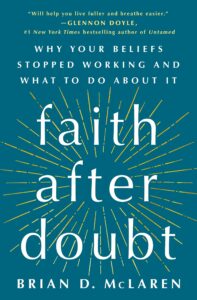 What is it, he wonders, that people are doubting? Although he is never glib about it (realizing how disorienting and even painful it can be to move away from earlier convictions and faith communities) he asks if maybe we should doubt some of the inherited notions and practices from a former theological tradition or religious subculture. He doesn’t say “good riddance” but he might have. Perhaps one step in coping with our doubts is realizing that doubting is often quite healthy and that some things, indeed, should be not only questioned but renounced. He helps post-evangelicals and religious nones to discover what can be rejected and what, on the other hand, might just be true and good and beautiful. To enter into that kind of journey away from toxic of dysfunctional faith and towards something healthy and generative, one has to doubt. As he puts it, doubt can save the world!
What is it, he wonders, that people are doubting? Although he is never glib about it (realizing how disorienting and even painful it can be to move away from earlier convictions and faith communities) he asks if maybe we should doubt some of the inherited notions and practices from a former theological tradition or religious subculture. He doesn’t say “good riddance” but he might have. Perhaps one step in coping with our doubts is realizing that doubting is often quite healthy and that some things, indeed, should be not only questioned but renounced. He helps post-evangelicals and religious nones to discover what can be rejected and what, on the other hand, might just be true and good and beautiful. To enter into that kind of journey away from toxic of dysfunctional faith and towards something healthy and generative, one has to doubt. As he puts it, doubt can save the world!
As the publisher puts it, in Faith After Doubt: Why Your Beliefs Stopped Working… “comes a bold proposal: only doubt can save the world and faith. The author proposes a four-stage model of faith development in which questions and doubt are not the enemy of faith, but rather a portal to a more mature and fruitful kind of faith.”
Not bad, eh?
In Part One of the book he describes — in a way I’ve never read before (and I’ve read a lot on this topic) — what he calls “Your Descent into Doubt.” He has a chapter naming doubt as loss; another called “Doubt as Loneliness.” He explores how it can be a real crisis, but then shifts to a chapter called “Doubt as Doorway.” The fifth chapter in this first part is showing how doubt can be a time of genuine growth. Nice!
Although I need to re-read it more carefully when I get a hard copy (I’ve been skimming on my advanced electronic version) but I think I loved the next few chapters. This is, again, a vision of doubt that I am sure will be a surprise to some but might just put words to those who have these feelings but didn’t have words to describe it. At least not these words. This is good stuff. He calls this next unit “All In Doubt.” There are five chapters but the first three here are notable:
Doubt as Descent
Doubt as Dissent
Doubt as Love
(Indeed, in a following section he writes about “revolutionary love.” He’s “all in” on this, and believes that as people are honest about their deepest beliefs, their more real longings, their truest truths, the will come to a better understanding of this human predicament — sussing the difference between faith and beliefs. This has long vexed Christianity, and most — liberals, conservatives, Catholics, maybe the Orthodox — although they disagree about doctrines and convictions and beliefs, wrongly conflate belief and trust. As if faith means to know the facts in one’s head, rather than the more richly heart-felt, relational yada yada yada knowing of the Scriptures.
(Almost anyone who has been around the church for a while has heard a sermon on this — that in the Bible faith is less about propositions and more about a Person, it is less about rationalism and more about relationships — but, still, we conflate convictions with trust, demanding that people say what ideas they have about religion and often don’t get around to helping them enter into a bone fide relationship with the Divine. James K.A. Smith’s You Are What You Love is one way to get to that insight; the third chapter of J.I. Packer’s Knowing God might be another, that describes the difference between knowing and knowing about.) McLaren understands this and while he surely isn’t opposed to formulating ideas and proposing truth claims (he writes books and books and more books, after all) he shows the difference between a mere intellectual assent and a living relationship. And he has the touch of a poet, which doesn’t hurt.
And then, after all this framing of the matter in fresh, if a bit progressive ways, he gets to the part that many readers are eager for. What do we do with “life after doubt.” Or, rather, as McLaren puts it, “with doubt.” And here is where it gets interesting. I will let you savor these provocative chapters — use the prompts for reflection after each chapter and the study guide at the back to read this with others — but his theme by the end is (get this): harmony. We need communities of harmony and theologies of harmony and he offers some guidelines for spiritualities of harmony. He pays attention to the shifts in religious studies and experiences and the realities in the broader religious landscape. He has some words for the rising generations. He assures us all who are feeling disoriented with our times and with our own hearts “you are not crazy and you are not alone.”
There is even more content, making this book a real resource for those who doubt and for those who lead faith communities who may want to offer programing around talking safely about our doubts. (Being communities of harmony who offer theologies of harmony, recall, will helps us create these sorts of safe spaces, out of which can emerge true, generative, spiritualities, communal practices of encountering God in our midst.) There are several appendices and guides and resources.
Brian McLaren gently moves us away from the notion of God as vengeful and petty, ready to punish those who question and challenge beliefs that no longer harmonize with their evolving experience and honest understanding. Brian encourages the reader embrace a deeper, wider, and more authentic faith that doesn’t fear doubt, but welcomes it as an ally in their spiritual growth. This book will save lives. — UCC Bishop Yvette Flunder, author of Where the Edge Gathers: Building a Community of Radical Inclusion
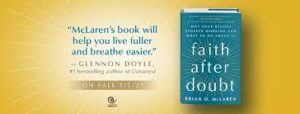
HERE’S A SPECIAL GIFT OFFER FOR THOSE WHO PRE-ORDER THIS FROM US HERE AT HEARTS & MINDS. WE WILL PROVIDE A HANDSOME BOOK PLATE AUTOGRAPHED BY BRIAN MCLAREN FOR THOSE WHO ORDER BEFORE THE END OF THE YEAR.
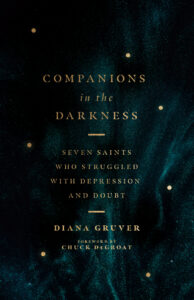 Companions in the Darkness: Seven Saints Who Struggled with Depression and Doubt Diana Gruver (IVP) $17.00 || OUR SALE PRICE = $13.60
Companions in the Darkness: Seven Saints Who Struggled with Depression and Doubt Diana Gruver (IVP) $17.00 || OUR SALE PRICE = $13.60
release date – November 24, 2020
This is another book about faith in hard times, about doubt, and, more specifically, about depression. If we were in a season that was not plagued with the pandemic, we’d have this lovely author, Diana Gruver, in the store for a bone fide book launch event. She lives in central Pennsylvania and we have bunches of mutual friends. We are delighted to get reconnected with her in recent years and it is always a very special delight when a customer of ours publishes a book. And what a book it is. We are honored to get to tell you about it here and announce that we hope to do a Facebook Live interview with her sometime within the next few weeks. Stay tuned! We want to support this new author and her excellent books and we’re honored that she wants to send some orders our way. Thanks, Diana.
Here’s what you should know about this remarkable book. I don’t say this often, but when I do, I’m glad — there is nothing quite like this in print, as far as we know. In fact, I said this in an endorsing blurb on the inside over (which gives us yet another sense of connection to the book.)
Here’s what I said:
It is rare to say that there is no other book like this, but with Diana Gruver’s Companions in the Darkness she has done something that no other book has done: given us true companions for dark times by exploring the depression of older Christian leaders. She weaves in her own story of depression, offers contemporary psychological insight about mental health disorders, and invites us to take heart; we are not alone. Through her keen eye―an eye sensitive to suffering―she helps us understand Martin Luther’s melancholy and physical pain, William Cowper’s despair, Martin Luther King Jr.’s exhaustion, and Mother Teresa’s dark night of the soul. These biographies are interesting and informative, but more they are manna, light, and hope. Many will be grateful for this very fine and truly helpful exploration.
Perhaps you could appreciate the value of this brand new book by noting what others have said:
With wise insight and palpable compassion, Diana Gruver recounts the oh-so-human stories of Christians revered across the centuries as leaders, as achievers, as exemplars. For all of their fame as ‘great’ Christians, these saints tasted their own radical vulnerability and knew the anguish of mental illness. To all who seek God yet suffer, there is comfort to be found in this sacred company among the brothers and sisters who lived faithfully amid struggle, the companions and guides who assure us that depression will not have the last word. Practical and deeply personal, Companions in the Darkness is a gift to us all.” — Karen Wright Marsh, author of Vintage Saints and Sinners and executive director of Theological Horizons centered at the Bonhoeffer House, Charlottesville VA
Diana Gruver has written a compelling book. In it she tells the stories of seven historical figures, some but not all household names, who suffered severe depression. Gruver does it just right, avoiding the many pitfalls that could have made the book excessively sentimental or judgmental. She lets the individuals describe their own experiences, refusing to subject them to modern clinical diagnosis. She chooses quotes from their writings that are so profound, human, and powerful that I kept tearing up, drawn into the nightmare of their condition. Her writing is clear and cogent and luminous. She tells their stories with sensitivity and compassion. She gives her subjects voices, as if letting them speak across the years to us. Her commentary and reflections along the way are full of hope. This is the kind of historical writing that is both responsible and moving. I will recommend this book to my friends. –Gerald L. Sittser, professor of theology at Whitworth University and author of A Grace Disguised
These two blurbs are significant — Karen Marsh herself has written one of the very best anthologies a collection of short biographies of a good handful of “sinners and saints.” She knows how hard it is to get it right, informative, interesting, inspiring, historically honest and culturally relevant. If she thinks this story of “seven saints” is well done, you can trust that.
Similarly, Gerry Sittser is one of our finest popular theologians. I’d commend any of his books. A Grace Disguised, though, remains a book we routinely recommend as it is one of the most honest, moving, and faithful books about bereavement and grief of which we know. That he endorses Ms. Gruver’s book is notable, to say the least.
Further, on the back and inside are raves by some who have themselves written candidly about faith and their struggle with depression — Zack Eswine (who has a little book about Charles Spurgeon’s bouts with depression) and Amy Simpson, author of Troubled Minds and Anxious, and novelist Sharon Garlough Brown who wrote a novel about the spirituality of depression called Shade of Light. These are all good signs, that those acquainted with this particular sort of greif offer their support. Professionals in mental health care have weighed in as well, such as Dr. Richard Winter, professor emeritus of counseling and applied theology at Covenant Theological Seminary, author of When Life Goes Dark who writes, “This book is a wonderful and sensitive encouragement for any for whom life has become unbearably dark and for those who seek to help them.”
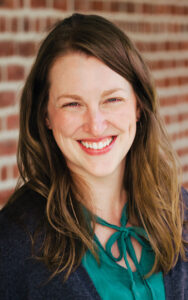 As you’ve gathered, I’m sure, Diana here is vulnerable about her own mental health challenges, telling of her own depression and struggles. More, though, than a memoir of those episodes, Companions in the Darkness show various faces of depression and doubt, exploring various manifestations in seven key Christians from the past. That is part of the point, that we are not alone in this struggle and that while we may have different sorts of names and nuances of description in our modern psychological setting, the notion of melechony is not new. And it is not uncommon. And there are a variety of ways to cope and live through it.
As you’ve gathered, I’m sure, Diana here is vulnerable about her own mental health challenges, telling of her own depression and struggles. More, though, than a memoir of those episodes, Companions in the Darkness show various faces of depression and doubt, exploring various manifestations in seven key Christians from the past. That is part of the point, that we are not alone in this struggle and that while we may have different sorts of names and nuances of description in our modern psychological setting, the notion of melechony is not new. And it is not uncommon. And there are a variety of ways to cope and live through it.
The “seven saints who struggled with depression and doubt” explored by Gruver include (in the order she presents them) Martin Luther, Hannah Allen, David Brainerd, William Cowper, Charles Spurgeon, Mother Teresa, and Martin Luther King, Jr.
Most of these Christian people wrote detailed diaries and journals and letters about their afflictions and, in many cases, their contemporaries wrote about them. Gruver’s well researched accounts are often riveting, painful, even — Hannah Allen’s attempts at suicide in the mid-1600s and her delusional spiritual experiences were grueling. They are candid (even thouse of us who know about MLK’s doubts and Mother Teresa’s “dark night” might be taken aback) but, yet, hopeful. In each case, she tells what caring friends did, what the sufferers themselves recommended (Luther, of course, commended eating and drinking, jest and laughter, even; William Cowper the Puritan hymn writer and friend of John Newton, recommended pursuing art and friendship.) The practical insights for any of us who may be companions to the hurting are clear and evident. A book like this should be on every pastor’s shelf and in every church library. The foreword, by the way, is by a writer we admire greatly, Chuck DeGroat. He knows the abyss himself, he explains, and now, as a professional counselor, he sees the devasting results of those who are too ashamed to get help or who feel like they are alone.
One would like to say that we no longer believe in the church that depression is the cause of sin or that helpful medications are somehow for those who don’t have strong enough faith. That is hurtful rubbish, but yet, I’m afraid some of that stigma is still around… and so, we commend this not just to those who are hurting or to those who want to be wiser caregivers to accompany others through their dark nights of panic attacks or depression or thoughts of self-injury. It is a book for all of us who want a better glimpse into the human condition, who want a good look at discipleship and spiritual formation as it was understood, even centuries ago, by way of these historical vignettes.
WE DO HOPE TO DO A FACEBOOK LIVE EVENT WITH DIANA GRUVER IN THE NEAR FUTURE. WATCH THE HEARTS & MINDS FACEBOOK PAGE FOR UPDATES.
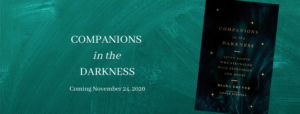
You can easily order by using the “order” link at the end of this column. 20% off too.
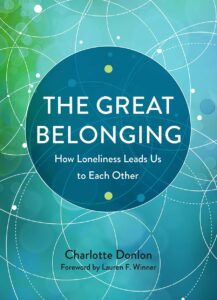 The Great Belonging: How Loneliness Leads Us to Each Other Charlotte Donlon (Broadleaf Books) $16.99 || OUR SALE PRICE = $13.59
The Great Belonging: How Loneliness Leads Us to Each Other Charlotte Donlon (Broadleaf Books) $16.99 || OUR SALE PRICE = $13.59
release date – available now
Perhaps you will recall that I’ve reviewed a few books in recent weeks that are mostly about civic life, about our increasingly harsh polarizations, about those who feel alienated even from their own places. Loneliness, we have said, has reached epidemic proportions and has sad consequences for individuals but also contributes to the fraying fabric of our societal life. It is bad, and it is getting worse.
And yet, despite the newer ways in which loneliness may afflict us — social media being one obvious culprit, not to mention the recent quarantining — what if this is not so new, maybe not so unusual. This riveting, beautifully written and compelling work argues that loneliness may be a necessary part of the human condition. Charlotte Donlon, here, is giving us an altogether novel look at this much-discussed topic. (And, surprisingly, what is novel about her approach is, among other things, that she draws on ancient spirituality, and surprising other sources (as we shall see) if not in the same way as Gruver does, in the book above. Yet, she offers a profound look, reflecting on how others understand their loneliness and how we might move in creative ways to enter “the great belonging.”
Curiously, as I read my way through some of this I began to wonder (as we often do here at the shop) where it belongs — that is, on what shelf? Our other books on loneliness are in a section with other issues and concerns about our emotional lives — depression, anxiety, anger, forgiveness and the like. That is next to a section on relationships, family systems, sort of the self-help into psychology section. But The Great Belonging (whose author is a spiritual director) seems to have the eloquent feel of a book about spirituality. It almost seems to go with other books on our interior lives and cultivating a sense of God’s presence in our authentic selves. (But then there are those great chapters on family life, mother-daughter stuff, parenting…)
Ms. Donlon is a very good writer, as I expected. I heard from a very creative and colorful friend that she was working on this manuscript — she had taken creative writing courses through the famous and beloved Glen Workshops, affiliated with Image Journal. So I knew it was going to be well done, thoughtful, yes, but beautiful, as well. Perhaps you saw an early piece of it at the classy Mockingbird website’s blog.
friend that she was working on this manuscript — she had taken creative writing courses through the famous and beloved Glen Workshops, affiliated with Image Journal. So I knew it was going to be well done, thoughtful, yes, but beautiful, as well. Perhaps you saw an early piece of it at the classy Mockingbird website’s blog.
And then I heard that Lauren Winner had agreed to write a foreword. Man, when Lauren writes a foreword, readers get their money’s worth, and the author and publishing house are in gratitude. In the several opening pages (that I have read more than once) Winner tells what is so very good about this book and why she is so pleased to promote it.
Winner starts her forward telling you just what the book is about and why she’s interested:
The book you are holding does not aim to cure your loneliness. Instead, The Great Belonging addresses loneliness as a companion. As you would with any companion, The Great Belonging inquires into loneliness — into loneliness’s history, and habits, and fears. And in the company of The Great Belonging’s fearless and smart author, Charlotte Donlon, we, the readers, are allowed to indulge our interest in loneliness. I, for one, am interested in both senses of the term. I am curious about loneliness, and I am involved in loneliness, affected by loneliness, implicated in loneliness. I am companioned by it; I want to get to know it better.
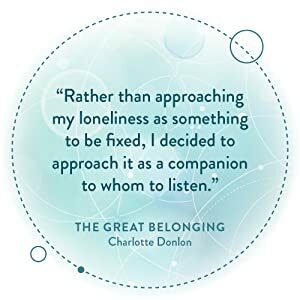 And here is the big, big thing: as Lauren suggests in that first sentence of the foreword, Donlon doesn’t try to cure you loneliness. She doesn’t even quite want to give you tools to cope with it. The question is, how can we enter into it more honestly, fruitfully, growing from it without merely bemoaning it.
And here is the big, big thing: as Lauren suggests in that first sentence of the foreword, Donlon doesn’t try to cure you loneliness. She doesn’t even quite want to give you tools to cope with it. The question is, how can we enter into it more honestly, fruitfully, growing from it without merely bemoaning it.
Of course, she is not glib nor simplistic — her mature faith and sophisticated sense of our interior lives wouldn’t permit anything cheap or piously cheery. No — not unlike Tish Warren’s nigh-time prayers, or McLaren’s doubts, or Gruver’s pained companions in depression — Donlon realizes we dare not cover this stuff up. It can be soil for growth, for deep and human and lasting spiritual transformation, but it will not be easy. The Great Belonging really is a lovely, little book, but it ain’t easy.
Those who read in the field of spiritual formation will see the layers of meaning in the phrase “the great belonging.” It sounds like Merton, doesn’t it? Shades or Richard Rohr, maybe, or at the least Phyllis Tickle? But, it seems (and I am not done with this book yet, and I am sure it is not yet done with me) she is drawn also to authors like the great Covenant College prof Kelly Kapic, whose book, Embodied Hope: A Theological Meditation on Pain and Suffering she cites. She references the Book of Common Prayer and talks about doubt and depression. (You can see why I had to include this brand new release with these other soon-to-be-released titles.) She quotes Kevin Twit of the Indelible Grace hymns project (yes, on songs of lament in the old hymns.) She sees loneliness is big terms and sees the sort of “belonging” it can point us to in a broader scope than you might expect. She has a section about cultivating connection with our places and there is a chapter called “Suffering, Resilience, and Our Hope for Shalom” on which she riffs on Nicholas Wolterstorff and his extraordinary neo-Calvinist book Until Justice and Peace Embrace.
Did I mention that the chapters are short? The are mostly brief but always nicely written, some very anecdotal, some more like reflections. They are substantial and thoughtful, but not lengthy or tedious.
I won’t spoil the fun and fascinating of reading this book by writing about it all, covering as much ground as it does, and complicated as the anguish may sometimes be as it invites us to dwell in our aloneness and loneliness. Just believe me — there is a lot going on here, and a lot of really interesting insights along the way.
She is happily married, by the way (and has two brief chapters about sex — one about not having sex, and one about having sex — which are frank and important for married couples, I’d say.) She has children, and writes about them, and, also, about her mother. It hardly needs saying, but I will: The Great Belonging is not only for single people or those who seem to not have friends or family or community. Many of us who are embedded in caring families and who are active in vital faith church bodies still, at times, yearn for deeper connection, for belonging.
No, this is for all of us, truly. (I think of the popularity of another recent and very good book entitled Belonging: Finding the Way Back to One Another by Sharon Hersch and, naturally, one we reviewed here a month or so ago, the excellent Wait with Me: Meeting God in Loneliness by Jason Gaboury, another book that does not intend to “solve” your problem with loneliness.)
Here is something, again, to say that is extraordinary about The Great Belonging. Not only is Charlotte Donlon a great writer and a versatile thinker and a good storyteller, she really does believe this stuff about our loneliness pushing us to connect with the world beyond us. Not just with others, with self, with God, but with the world, it’s glories, its needs. She has a good bit about coming to meet yourself more, but also about being aware, more attentively and spiritually, of creation around us. There is a whole section about connecting and belonging by taking in great art. She has a handful of chapters and mediations on that theme alone — a chapter describing “portraits of loneliness” and another on the notion of Visio Divina.
In the fabulous large appendix that offers all sorts of Bible texts and prayers and quotes and hymns and ideas for spending time alone facing up to our aloneness, she has a excerpt by Daniel Siedell, a piece where Dan talks about view art in a museum as prayer and a wonderful quote by Mako Fujimura. And then this prayer that intrigues me, for going to a museum:
Lord, open my eyes to notice the colors, lines, shapes, textures, skill. Open my soul to your wonder, beauty, vastness, glory, and mystery. May I see the works of art with clarity, and may they see me.
 The book was just released by Broadleaf Books which is a recent imprint of Fortress Press / 1517 Media. We stock most of their books. Here is how they describe The Great Belonging: How Loneliness Leads Us to Each Other:
The book was just released by Broadleaf Books which is a recent imprint of Fortress Press / 1517 Media. We stock most of their books. Here is how they describe The Great Belonging: How Loneliness Leads Us to Each Other:
What if it is a current that leads us deeper into belonging — to ourselves, to each other, and to God? In The Great Belonging, writer and spiritual director Charlotte Donlon reframes loneliness and offers us a language for the disquiet within. Instead of turning away from the waters of loneliness for fear they will engulf us, she invites us to wade in and see what we find there. In vulnerable, thoughtful prose, Donlon helps us understand our own occasional or frequent loneliness and offers touchpoints for understanding alienation. We can live into the persistent questions of loneliness. We can notice God’s presence even when we feel alone in our doubts. Ultimately, Donlon claims, we can find connection that emerges from honesty, and she offers tools, resources, and practices for transforming loneliness into true belonging.
You can easily order by using the “order” link at the end of this column — 20% off, too. Thanks for your support.
BookNotes

SPECIAL
DISCOUNT
20% OFF
ANY BOOK MENTIONED
+++
order here
this takes you to the secure Hearts & Minds order form page
just tell us what you want
inquire here
if you have questions or need more information
just ask us what you want to know
Hearts & Minds 234 East Main Street Dallastown PA 17313
read@heartsandmindsbooks.com
717-246-3333
